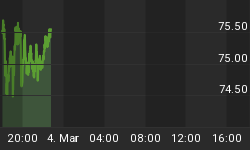Chairman Bernanke took to Capitol Hill today to discuss the economic and monetary policy outlook for the country. His remarks were, typically, fairly unremarkable. Some observers had expected him to signal a change from what had recently been discussed in the FOMC minutes - the unusual quiet among Fed speakers led to speculation that they were avoiding cluttering the message. Presumably, the change they expected was towards a softer policy, edging more towards a second round of quantitative easing. At least, the response of equities to a fairly dull testimony - they dove - seems to suggest that investors wanted more.
The only real nugget in his prepared statement was that the Chairman referred to the "unusually uncertain" economic outlook. These days, one might argue, "unusually uncertain" is pretty normal. The implication for monetary policy is that extra caution is warranted, because the Committee can be less sure of the effects of their actions.
That is mostly an illusion, though. The Federal Reserve Board suffers, as d0 most individuals and all committees, from the behavioral bias of overconfidence. Given the historical difference between the Fed's forecasts and the actual outcomes, over many many decades, the Fed should treat the outlook as extremely uncertain. The implication of that observation, however, is simple: the Fed should almost never do anything.
Policymakers fool themselves into thinking that they need to do something, and so they do something, and they very often muck it up in the process. As I argued in my book (have I mentioned recently that I am offering an on-line bargain here?), the FOMC should manage policy to minimize mistakes rather than maximize good outcomes. They are short "policy options" in which doing the right thing offers a little upside but doing the wrong thing promises a huge downside. It is great news for those of us who will bear the costs of their actions that right now they actually know that things are uncertain, and are hesitant to do anything. It's kind of like "monetary policymaker gridlock."
It may not be quite as good news for investors in stocks, who are dependent on a further steroidal lift to the market. Recent earnings have been weak in some unusual places, such as at Goldman Sachs: that firm managed to miss earnings forecasts by 60%, which is pretty hard to do since all of the Wall Street analysts tend to give each other easy hurdles to beat, on an 82% decline in profits. There have been a few other banks that have had weak earnings. This shouldn't be surprising: lower leverage, lower turnover, and lower margins adds up to lower return on equity. I guess it is surprising that it is happening so soon - the banks who are hitting their numbers are the ones that are drawing down their reserves, which is also known as "cheating."
Monetary policy makers are right to be concerned about the uncertain outlook. A whole lot of that outlook depends on whether fiscal policy gets tight soon, or whether it stays loose and gets even tighter later. It appears Congress is going to extend unemployment benefits, but it has been a challenge to get that bill through. Goldman is calling it "The End of the Road for Fiscal Stimulus" in a recent research piece. Their economics team is assuming that virtually no other major stimulus, other than the extension of the Bush tax cuts for households with incomes below $250,000, will be passed. This includes their assumption that capital gains and dividend rates will go up to prior levels. They estimate that the result of these fiscal tightenings will be a drag on GDP (also known as "payback for pulling demand forward to make the recession appear to go away") of 0.50% in Q3 and 1.25%-2.5% for each of the next five quarters - that is, for all of 2011.
I, like many others I am sure, was spooked out of being short yesterday. A short feels better today and with Existing Home Sales (Consensus: 5.1mm from 5.66mm) tomorrow it is likely to feel even better (Initial Claims, consensus 445k from 429k, will continue to be polluted by the GM non-shutdown and so not worth much attention). I don't like the entry point, but when stocks start to move lower the market may well not offer a good entry point.















